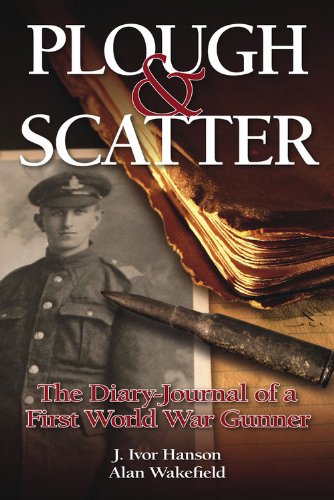I only blogged about Ivor J. Hanson a couple of months ago but the significance of today's date, when Britain declared itself at war with Germany in 1914, brings me back to him and his astonishing war diaries that were collected and edited by Alan Wakefield and published by Haynes in 2009.
Plough & Scatter, The Diary-Journal of a First World War Gunner begins on 18th July 1914 and ends on 4th March 1919. The entries are pragmatic, informative and without any trace of sentimentality or self-pity: the words of an articulate young man who loved his Welsh home, his family and his books, but whose boyish enthusiasm to 'do his bit' was culled by the reality of war.
Plough & Scatter, The Diary-Journal of a First World War Gunner begins on 18th July 1914 and ends on 4th March 1919. The entries are pragmatic, informative and without any trace of sentimentality or self-pity: the words of an articulate young man who loved his Welsh home, his family and his books, but whose boyish enthusiasm to 'do his bit' was culled by the reality of war.
My Dad's father, Grampa Evan Rees, served in WWI, either in the Royal Field Artliiery or the Royal Horse Artillery. There were medals in a drawer in the sideboard, or there weren't any. The memories of the remaining sons vary and we cannot be sure of his story. Perhaps that's why Hanson's diary feels so important: it records one man's story in detail for us to read, share and remember. His story is also, in part, our grandads' and great-granddads' stories, the ones who came home but didn't talk about what happened, what they saw, who they lost. And it is also, in part, the story of the boys and men who never came home.
There's a copy of the book at Taibach Community Library. You'll read the following on page 228:
Hell cannot be much worse than this, for everything contrives to break our spirits.
So difficult for us to know and understand what these men went through. So important that we should try.
There's a copy of the book at Taibach Community Library. You'll read the following on page 228:
Hell cannot be much worse than this, for everything contrives to break our spirits.
So difficult for us to know and understand what these men went through. So important that we should try.



 RSS Feed
RSS Feed